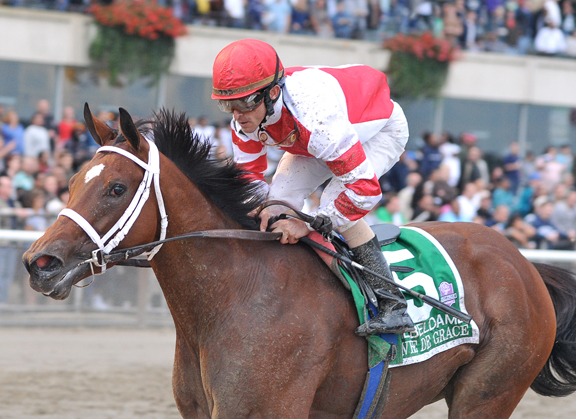By Bill Finley
One of the most successful and respected owners of his era, Rick Porter died on June 6 after a long battle with cancer. He was 80 years old.
He campaigned three Eclipse Award winners: Kodiak Kowboy (2009 sprinter); Songbird (2015 2-year-old filly and 2016 3-year-old filly) and Havre de Grace (2011 older mare and Horse of the Year).
Before he was an owner, Porter was a racing fan. He was born in Wilmington, Delaware and began accompanying his parents to Delaware Park as a child where his father made $2 show bets for him. After a stint in the Army, he got into the car business at age 22 and turned his Porter Auto Group into one of the leading auto dealers in the Mid-Atlantic region.
Porter didn't come aboard as an owner until 1994. He was introduced to John Servis by one of his employees and decided to open a small stable with Servis as his trainer. With Servis, he had his first taste of success at the highest levels of the sport with Jostle. She won four graded stakes in 2000, including the GI Coaching Club American Oaks and the Alabama S.
Porter's stable typically included about 25 to 30 horses, but those modest numbers didn't keep him from churning out one star after another. He won his first Breeders' Cup race with Round Pond, the winner of the GI Breeders' Cup Distaff in 2006. In 2007, he won the GI King's Bishop with Hard Spun. His best horse the following year was the ill-fated filly Eight Belles, who was injured after finishing second in the GI Kentucky Derby and had to be euthanized.
Porter was hit so hard by her death that he contemplated getting out of the sport. Instead, he regrouped, stayed in and kept on coming up with quality horses.
In 2011, Porter's Havre de Grace had a season that was Hall of Fame worthy. She won the GI Apple Blossom H. The GI Beldame Invitational S. and then beat males in the GI Woodward, a victory that helped her earn the Horse of the Year title.
As good as she was she probably wasn't Porter's best filly or mare. Porter's Songbird was sensational. She won 13 of 15 lifetime starts and 12 stakes and was champion 2-year-old filly in 2015 and champion 3-year-old filly in 2016. Though she was defeated by a nose, her battle with Beholder in the 2016 Breeders' Cup Distaff was considered among her best efforts in a race many say was one of the best Breeders' Cup races ever.
“We lost a gem in horse racing,” said trainer Larry Jones, who started working for Porter in 2006. He treated racing like a business, but he also treated it like a love affair. He's going to be sorely missed.”
“We had more than an employee-employer relationship, which is why I fired him in 2009,” he continued with a laugh. “But the beauty part was when I started back training for him in 2011. We were friends. We were great. I tell my owners that I have the best job in the world because I only train for people I like. Rick and I became very close friends and he supplied me with such great horses.”
Like so many others who remembered Porter, Jones cited his deep caring for the horse.
“The thing about Rick was, no matter what, his horses always came first,” he said. “It was never, `let's see if we can get one more race out of him. If we told him a horse needed time, he'd say, `well, let's just retire him.'”
Together, Jones and Porter experienced one of racing's great tragedies with Eight Belles.
“It was a hard time,” said Jones. “He was a sportsman, and he wasn't afraid to take a challenge, and needless to say, Eight Belles ran the race of her life. But people criticized us for so much stuff that we hadn't done. It was very unfortunate that she stumbled, but I was hearing that she had been on steroids, and we had super testing done later to prove that she was not. In the end, they saw that fillies could compete against colts without steroids, and they changed the medication rules not because of something she had done, but because of something she had not done. And we hoped that she had changed the business for the better.”
While Porter considered getting out of the business, in the end he did not; nor was he afraid to run a filly against the colts again.
“We had the best mare in training in 2011, and we beat the boys in the Woodward that year,” said Jones of Havre de Grace. “He was willing to take a gamble and to take a competitive deal and prove she was good enough. He would race them as long as they were sound to go. But he never asked us to push the envelope in any way.”
Porter told the TDN's Christie DeBernardis in 2017 that Songbird was his favorite horse.
“Songbird, no question,” he said. “Havre de Grace was a great horse, but she didn't get the excitement. She sure was fun to watch and if she hadn't gotten hurt in that race in New Orleans, we would have kept on going;. I would have done the same thing with Songbird. I would have campaigned her as a 6-year-old if I could. Give me a Beholder!”
Porter said he tried to approach the racing business like he approached the car business.
“As much as possible I try to copy my ideas from my other business,” he said in 2017. “Racing is a sport but it's also a business. In any business, the biggest thing is surrounding yourself with the right people. I have Tom McGreevy, and I don't think anybody can do a better job when it comes to picking out horses. I have Victoria Keith working for me and she has been a huge help. She can do a little bit of everything.”
Porter, who raced under the name of Fox Hill Farms, returned to the headlines in 2019 with Omaha Beach. After winning the GI Arkansas Derby, he was installed as the morning line favorite for the Kentucky Derby but had to be scratched after being diagnosed with an entrapped epiglottis. Upon his return, he won the GI Santa Anita Sprint Championship and the GI Malibu S. but again had a run of bad luck. He was scratched from the GI Pegasus World Cup when coming down with swelling in his right hind leg.
Porter enjoyed success last year with Jolie Olimpica (Brz), the winner of the GII Monrovia S.
Porter, who preferred racing to breeding, parted with his star mares at the fall sales and was rewarded handsomely. Havre de Grace sold for a record $10 million as the 2012 Fasig-Tipton Kentucky Fall Mixed sale. Five years later, Songbird went for $9.5 million at the same sale. Round Pond was also sold at the Fasig-Tipton sale, where, in 2007, she was purchased for $5,750,000.
“Rick was one of the most valuable mentors I had in the horse business,” said Mark Taylor, the vice president of sales and marketing at Taylor Made who sold both mares for Porter. “He was just a brilliant, brilliant guy who had the ability to surround himself and his horse operation with very talented people, then make business decisions based off of their cues—and sometimes, better business decisions than those people themselves could have made on their own. He could filter information from various sources, and then make the right call on selecting a horse. He was a very honest person, and really cared about his horses deeply.”
Taylor said that over the years, Taylor Made consigned 13 individual horses for Porter that brought at least $1 million at public sales, and that those horses cumulatively sold for $41.6 million, including Havre de Grace and Songbird.
“So if you think about those small numbers of horses that he actually bought over the years, and to come up with that many that were at that very, very top-end level, it just speaks volumes about his accomplishments,” Taylor said.
At the time of Songbird's sale, he said that racing was the part of the sport that interested him. “I am not into breeding,” he told TDN at the time. “The deal is if you are going to spend a lot of money you have to get those checks back that you make out to Keeneland and Boyd Browning.”
Havre de Grace and Songbird remain the two most expensive broodmares ever sold by Fasig-Tipton, but Browning said that he would be remembered for that and so much more.
“Rick was a true ambassador for our sport,” said Browning. “He was one of the new generation of owners who enjoyed sharing the ups and downs of his stable with fans and provided a great deal of information to create awareness, and to try to grow our sport. He was also passionate about aftercare, and about helping those who had served their country. He brought veterans to the Derby when he had Omaha Beach, and was a true patriot and proud American, naming horses after patriotic events like Omaha Beach and Normandy Invasion. In a way, it's kind of fitting that he passed away on D-Day.”
Off the track, Porter waged a long battle with a slow-growing type of lymphoma called Waldenstroms, which he was diagnosed with in 2001. By 2016, the cancer had grown far worse and he told McGreevy, his longtime bloodstock advisor, to look for a new job. After undergoing conventional treatments, Porter was accepted for a clinical trial at Massachusetts General Hospital that focused on CAR T cell cancer treatment. In August of that year he was told he was in full remission.
Porter was always happy to share his success with others and had a few favorite causes, among them honoring veterans. In 2013, Potter had the colt Normandy Invasion preparing for the Derby. He was able to find World War II veterans who took part in the Normandy Invasion and hosted them at Churchill Downs during Derby week.
“Equally noteworthy as his list of outstanding horses was his outstanding stewardship over his stable,” said Fox Hill's Victoria Keith in a statement. “His horses' well-being was always his top priority over any trophy. He believed in transparency, sharing vet reports publicly and being open with injuries and considerations regarding stable management. He encouraged fan interaction, making them feel part of the team. He welcomed the challenge of the best meeting the best on the track, resulting in some of the most memorable match-ups of the past decades. His empathy for horses in need led to the founding of the National Thoroughbred Welfare Organization (NTWO) which has rehomed over 250 at-risk horses in the past few years. His Fox Hill Farm became synonymous with excellence and ethical ownership.”
Porter formed the NTWO, an organization dedicated to keeping horses from being sent to slaughter, in 2018. Run by his Keith, his executive vice president, the NTWO went to work in Louisiana, a state where the slaughter problem was severe, and helped pull numerous horses out of the slaughter pipeline.
“Can we end the slaughter of Thoroughbreds one hundred percent? Maybe not, but I think we can end it 95%, and that would be pretty big,” Porter said when announcing the formation of the NTWO. “But our goal is to end it one-hundred percent.”
Porter is survived by his wife Betsy, sons Cory and Scott, daughter-in-law Inci, daughter Tracey and son-in-law John, and grandchildren Tim, Rebecca, Chessie, Lindsay, Christina, and twins Ainsley and Jack.
Funeral arrangements are pending.
Additional reporting by Sue Finley and T. D. Thornton
Not a subscriber? Click here to sign up for the daily PDF or alerts.









